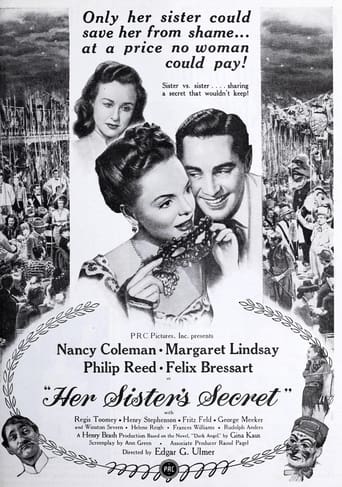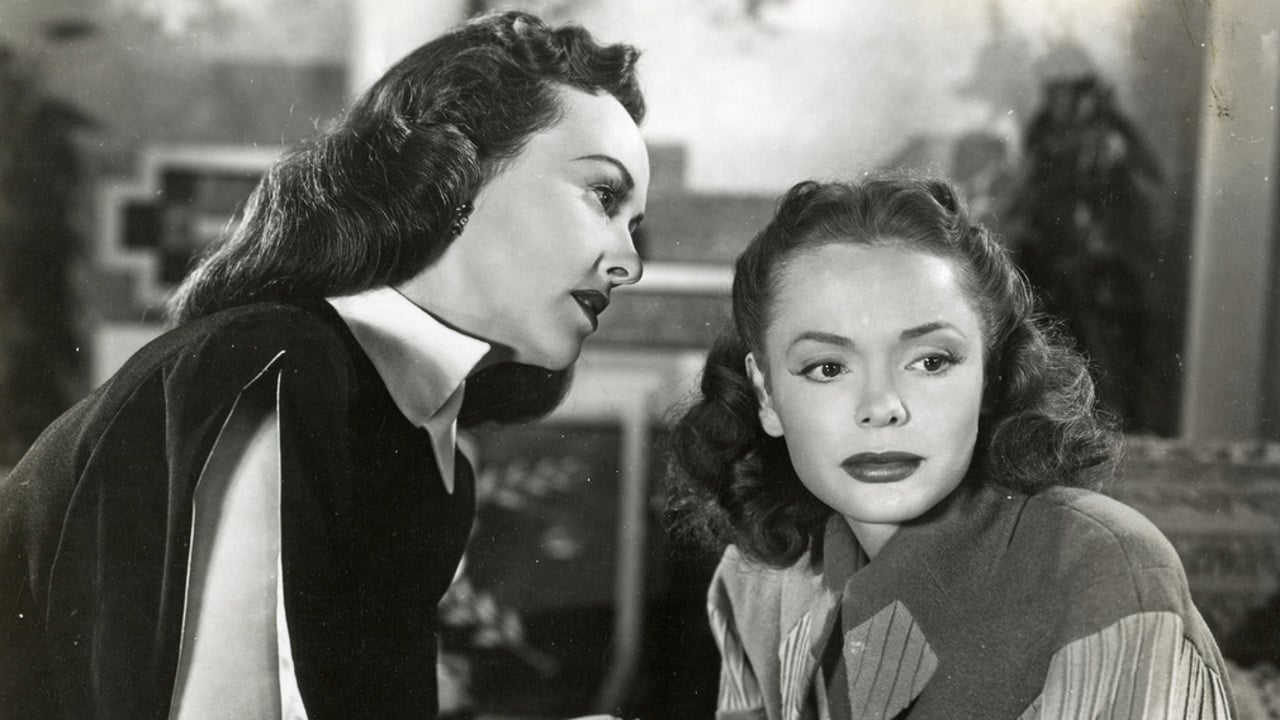RanchoTuVu
World War II era Mardi Gras in New Orleans complete with confetti, parades, and streamers, where the well-heeled daughter of a scholar on the Mayas meets and has an "indiscretion" with a soldier about to be shipped out to fight in the war. The real drama comes after the baby arrives and the meaning of the film's title becomes clearer, as the older sister of the young woman convinces her that she and her (the sister's) husband could raise the baby as their own and everyone would believe they were the baby's biological parents. The story moves from New Orleans to New York with a stop at a ranch in Arizona, the young sister (Nancy Coleman) finds the emotional attachment to her baby is stronger than she expected and forces the older sister to hold her to her promise, which is the angle that really motivates the movie.
matthewwave-1
I just finished watching the film (thanx, DVR) and, unlike one earlier reviewer, I don't recall Robert Osborne saying it was a great film. Tho he did praise Ulmer in general. But I readily admit my memory of the introduction might not be perfect; I just don't remember him calling it a great film.It's not a great film. But it is a good one. Despite what yet another reviewer said about the budget, it's definitely a B-movie, probably shot very quickly -- just probably with a bigger budget than some B's, and definitely well-crafted enough to look terrific. Stylishly shot for the most part, the best-looking part is, of course, that marvelously fluid Mardi Gras first act. I was really impressed by how expansive and lively Ulmer, Planck and company could make their inexpensive, studio-bound Mardi Gras.Still, yes, this is a B, and there are some rough edges. A few blown edits does not a bad film make. Almost all of Ulmer's films, almost all B-movies, have flaws. Often, definitely often in Ulmer's case, they don't negate the strengths of the films -- in this case, smooth, confident direction and cinematography and, for 1946 at least, a *relatively* sensitive and intelligent approach to the subject matter -- more on that later. (It would probably take longer to recite a list of Detour's flaws than to watch the film -- and none of them matter in the slightest; Detour is a great film.)And the major performance were all quite good, altho I will say that Stephenson took top honors -- something not surprising from the great character actor.It's funny, reading the negative comments about Winston Severn as young Billy, because enjoying his adorable moppetedness in the film really got me thinking about child actors. Some are remarkable (Ann Carter in Curse of the Cat People, Anna Torrent in Spirit of the Beehive, Nicholas Gledhill in Careful, He Might Hear You, to name just three), but, to a certain extent, at least, extremely young actors, like Severn in this picture, are sorta bad-performance-proof.He played a three-year-old. He acted like a three-year-old. No, the "performance" wasn't smooth or "professional", but it was utterly real and engaging. No, it's true, he didn't always seem to know what he was doing -- just like many three-year-olds don't always look like they know what they're doing in real life. Would a better-trained (likely, older) kid who hit marks precisely and enunciated every line smoothly have necessarily been better for the film? I don't think so. Severn's utter kid-ness made Billy a hugely sympathetic character. I thought he was a striking plus for the film.The plot and script bow to filmmaking formulae of the times, and some of the character motivations and the plot developments that come out of them strain to work, but Ulmer and his talented actors handle them pretty well. For me, the hardest part of the film to live with was the very end -- with people other than poor Reid's character apparently getting to decide that he will never be allowed to know he even has a son! Holy keee-rap, that's cruel. But not unexpected from films of the time. As was pointed out, there are even better films of the era that dealt with similar themes (giving up one's child -- sometimes illegitimate,sometimes from a dead or supposed-dead spouse), and they, too, often featured parents and/or children who were conscioulsy denied by others the truth of their relations to each other. It sticks in my craw with those films, too.Matthew
tsmith417
This film was shown on TCM the other night and before it started there was Robert Osborne, lauding the talents of the director and saying what a great movie it was.I don't know what Mr. Osborne uses as his criteria for a great movie, but it sure ain't the same as mine.The acting was wooden. Everyone just stood there and spoke their lines at each other, not necessarily to each other. I've seen more emotion displayed by a marionette. The editing was choppy. In one scene the girl and boy are riding in a hansom cab and they're seated one way, in the next frame they've switched places, and then they go back to the first way.The sound quality was poor.I apologize to the reviewer who said he was so happy to have played the part of the child, but he was not that good and seemed to not even know what was going on most of the time he was on-screen.The story is an old one: an unmarried girl gets pregnant the first time she has sex, the father of the child disappears from her life so she goes away for 9 months and her sister/friend/mother tells everyone the child is hers, and the girl spends the rest of her life regretting her decision.The story was done much better by Bette Davis in both "The Old Maid" (where she plays the unwed mother) and "The Great Lie" (where she plays the one who adopts the child as her own). Don't listen to Robert Osborne and don't waste your time on this mess of a movie.
jjodo32
I found this a very touching film, perhaps because I too spent leave in New Orleans during Mardi Gras. However, in my case my loneliness was not assuaged by a tryst with a lovely young woman who gave me access to all the best New Orleans had to offer during wartime. In keeping with conventions of the day the woman is punished for her sin when, not having heard from her lover who has returned to duty, she gives up her baby to her married sister. Although somewhat dated & melodramatic the film works on many levels. I particularly liked the evocation of the New Orleans social scene during Mardi Gras, something I missed when I was there.


 AD
AD


